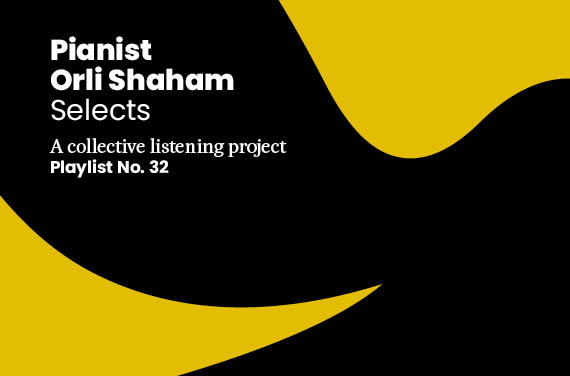Welcome to our 2024-2025 season!
Collective Listening Project
Pianist Orli Shaham Selects
Playlist No. 32
About the Playlist
October 22, 2020

Fresh from our 2020/21 season opener Watch Party last Thursday with the Takács Quartet (you can still listen to the post-concert Q&A here), we’re back with a new Collective Listening Project playlist—this one from an artist familiar to Princeton University Concerts audiences, pianist Orli Shaham. Featuring her “most beloved pieces that were written for students to play and listen to,” Orli’s imaginative playlist is conceived for the young and young-at-heart alike.
I’m thrilled to be invited to be part of the Princeton University Concerts Collective Listening project. There are always more interesting things to listen to than there’s time. I thought it would be good to share some of my most beloved pieces that were written for students to play and listen to.
SCHUMANN Scenes from Childhood (Kinderszenen), Op. 15
These pieces are absolutely my musical Proustian madeleines. Whenever I hear the opening, my entire childhood at the piano comes back to me. They were the first pieces I played that I fell in love with, and I’ll never forget the enthusiasm with which my then teacher Nancy Stessin taught me each one. And then when I heard Horowitz play the Träumerei, oh my!
PROKOFIEV Music for Children (Musique d’enfants), Op. 65
It’s no secret I adore the music of Prokofiev. My brother Gil and I had such a meaningful experience recording all of his works for violin and piano. That love grew out of Peter and the Wolf, of course, but also these little piano pieces. When I was really young, they were too complicated for me to sightread by myself. So my big brother Gil would come into the room and read one hand while I played the other. That experience taught me so much about chamber music, about note-reading, and about the genius of Prokofiev. Once I could play them by myself, I spent hours fooling around with them, though I don’t think my teacher ever knew.
DVORÁK Sonatina in G Major for Violin and Piano, Op. 100
Dvořák wrote this charming music for two of his children to play—not all of us have that parenting trick up our sleeves! My brother Gil and I weren’t kids when we recorded this, but we always have fun playing it together.
TCHAIKOVSKY Album for the Young, Op. 39 (Doll trilogy)
My first piano teacher, Luisa Yoffe, who was Russian, gave me many of these pieces to play. I found them so evocative, the titles igniting some seemingly real but clearly imagined stories in my mind. I felt like I knew the doll in the three Doll pieces personally. I cried as she fell ill and died, and I was personally invested in that new doll. It’s remarkable how storytelling helps us relate to music. With each of the pieces on this list, you can imagine the stories that accompany the music.
MOZART Piano Sonata No. 16 in C Major, K. 545
This sonata is one of the first “real” pieces most piano students play. I played it on my audition for Herbert Stessin when we first came to America in 1982. I didn’t understand much English, but I took in how impressive the drive was into Manhattan—it was my first time!—and how fancy the pre-war Upper West Side building with the ivies climbing on it was. And then entering his living room, with two grand pianos side by side, I understood how serious the moment was. I was still quite young, but I could feel how much more there was to explore. I think this sonata has that effect on many students. It seems so simple at first glance, but there are so many layers and technical obstacles to master. It’s Mozart at his best—luring us in with simplicity, only to have us realize the depth around it.
CLICK HERE for a special preview from my forthcoming recording of all of the Mozart Piano Sonatas.
DEBUSSY Children’s Corner, L. 113
Debussy dedicated this to his young daughter, whom he adored. Each movement paints a vivid musical picture, both with the evocative titles and with the varied textures and timbres of the notes themselves. Debussy introduces the young pianist to the many different colors that the piano is capable of playing. It’s a fantastic lesson in how pianists can use their hands as painters use different color combinations.
STRAVINSKY The Soldier’s Tale (L’Histoire du soldat) for Violin, Clarinet, and Piano
Stravinsky’s The Soldier’s Tale is an age old story of a confrontation between the devil and a mortal. The question it deals with is: What would you do to get the things you think you want? How far would you go? A couple of years ago, I created my own narration (see below) for a performance we did of this at Pacific Symphony. I hope you enjoy reading along as you listen to this trio version of the piece, and if you like, feel free to write your own version of the story to insert!
SAINT-SAENS The Carnival of the Animals (Le carnaval des animaux)
I have always loved Saint-Saëns’ Carnival of the Animals, and I can never get enough of his joke that one of the animal groups is “The Pianists!” I was thrilled when I had the chance to record it myself, with my good friend Jon Kimura Parker as the other pianist. The narration here was written by the brilliant poet Jack Prelutsky, and he reads it on this recording. He was such a witty character to be around, and I love the poetry in his many books. The album also includes his “Behold the Bold Umbrellaphant,” which has ingenious hybrid animals, my favorite being the Alarmadillo! P.S. You might also enjoy the 1976 Warner Brothers version of this piece starring Bugs Bunny and Daffy Duck and conducted by a very young Michael Tilson Thomas. Hilarious!
STEVEN MACKEY Sneaky March
A few years ago, I commissioned the composer Steve Mackey (on the composition faculty at Princeton University) to write a short, interactive piece for my children’s concert series, Orli Shaham’s Bach Yard. He came up with “Sneaky March,” and it has been delighting our audiences consistently ever since. I included a recording of it on an album alongside Stumble to Grace, the stunning piano concerto that Steve wrote for me.
Original narrative for Stravinsky’s The Soldier’s Tale
by Orli Shaham
This story is from a war, any war
The hero’s a soldier, from any corps
His name is Joe, not our clarinetist
But I do confess, I’m the librettist.
Joe’s marching home on leave, tired and hot
His pack’s on tight, but he’s not got a lot:
Some food, some clothes, and an old violin
So worn and beaten, it scratches his chin.
He cannot wait to see all his loved ones
And be free of these wartime conundrums
His arduous march seems to be endless,
Yet sure beats battle, and feeling friendless!
[Marche du Soldat]
By a babbling brook, our soldier rests
There’s so much noise from mosquitoes and pests.
“I’ll take out my old brown fiddle and play
There’s a tune I heard once off-off-Broadway!”
An old man approaches. “Oh, please, no guests!
I want to be alone!” Joseph protests.
But the man is persistent, and attests:
“Your fiddle is good, but my book is best.
I’ll trade you for it, you’ll be filthy rich!
You would be so clever to make this switch!”
So they exchange, a book for a fiddle,
And for three days, they live out this riddle:
How can a bright, thoughtful soldier not see
This visit’s length is in years, not days, three?!
And that kindly old man with his violin
Is Beelzebub, that master of sin!
[Le Violon du Soldat]
Now this part of the story is much more complex:
Joe’s fam’ly thought him dead, thanks to the Devil’s hex.
He used the book to gain untold amounts of wealth,
But, as we know, money does not spell mental health.
For you and me it’s so clear, we might even scoff
Perhaps all those mixed meters had thrown Joseph off!?
He decided to leave, to a faraway land
In order to win the local princess’s hand.
Nothing like love to cure what you think you’ve done wrong,
Or, if that fails, at least enjoy being headstrong!
But the Devil awaits him, ever one step ahead
With the violin in his hands, Joe’s as good as dead.
Here the tides turn, and Joe fin’lly appreciates
How, over Evil’s demise, he now officiates.
The plan is so simple: give up all the money!
If it’s worthless to you, it’s not even funny
How quickly the Devil’s power evaporates,
When Joe happiness and wealth no longer conflates.
There is one alternate plan I wish he’d courted:
Music and arts always need to be supported.
If the riches had gone there, would he still be free?…
No matter, with his old brown fiddle now in hand
Joseph performs a Little Concert gleefully!
[Le Petit Concert]
Music’s full power has now been restored
The princess won’t ever again be bored
She awakens and rises as if in a trance
And with Joe at the fiddle begins her wild dance
A strange Russian Tango provides the start
The gnarly rhythm is good for her heart
Next, she twirls in a Waltz ‘round the shiny dance floor
Until Joe must catch her from spinning out the door.
A dizzy Ragtime then completes the set
And Satan has officially lost the bet.
[Tango-Valse-Rag]
Our story is now almost all done
Still, Joseph wants to have a little fun
On violin, in one final rousing number
Calibrated to tear the Devil asunder,
He begins the wildest dance of them all,
So powerful as to make Evil fall.
The music has gotten under the dancing Devil’s skin
See what you can do when you learn to play the violin?!
[La Danse du Diable]



